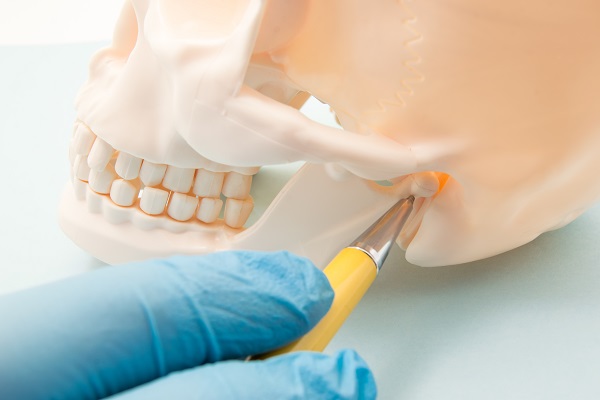Options for TMJ Disorder Treatment

You may not think much about TMJ disorder unless a dentist diagnoses you with it. This is a serious condition that can cause much pain and discomfort. Untreated, this disorder can make it difficult to chew and even speak. Instead of suffering and being in agony, you can speak to your dentist. Fortunately, relief is available with a few different treatments. Your dentist can look at various options.
A look at TMJ
On both sides of the jaws is a joint called the temporomandibular joint. This sliding hinge-like joint connects the jawbone to the skull. It is critical for any activities that require opening and closing the mouth. Most of the time, people do not even think about using this joint. However, injury, wear and tear, or bad habits can put a strain on the joint, irritating it.
Disorder of this joint can bring excruciating pain to the individual. The feelings can radiate up to the ears and throughout the face. The jaw may even be tender to the touch. This disorder can limit a person’s range of motion in the jaw. It may even cause headaches and interfere with a person’s quality of life.
Diagnosing the disorder
A person can look for the signs and symptoms of TMJ, but a dentist will diagnose it. The dentist will examine the patient and confirm that there are concerns with the joint. First, there will be a series of X-rays to see if there are visible signs of injuries. The dentist will look at the jaw and check the range of motion. It may even help to listen as the patient opens and closes the mouth, as the jaw could make popping or clicking sounds. The dentist will also press on both sides of the jaw and ask the patient how uncomfortable it is.
Medication
Controlling the effects of TMJ is a good first step that the dentist will take. The dentist can prescribe a variety of medications, including pain relievers and anti-inflammatories. Taking muscle relaxants can also help the person feel more comfortable and have an improved range of motion in the jaw. Some dentists may even give the patient an antidepressant, which is sometimes shown to relieve pain and help stop teeth grinding.
Physical therapy
Another approach is to walk the patient through mobility exercises to strengthen the jaw. The dentist can help the patient stretch the jaw muscles and improve flexibility with the joint. The patient should always follow the dentist’s instructions when it comes to these exercises. The dentist may also advise the patient to apply heat and cold packs to the jaw to reduce pain and any swelling.
Surgical options
In more advanced TMJ cases, surgery may be necessary and effective. One approach is a process called arthrocentesis. The dentist will drain the joint of fluid and other materials using small needles. Arthroscopy is another option and is less invasive than open-jaw surgery. However, open-jaw surgery may be the right treatment when other measures have not been successful.
You can find relief
Living with TMJ can be difficult. You should not have to suffer the effects of this disorder. Your dentist can properly diagnose you and provide the right treatment. If you have jaw pain, make a dental appointment today and get the help you need.
Request an appointment here: https://www.mysmilematters.com or call Wissler Myers & Kallies Family Dentistry LLC at (740) 780-0625 for an appointment in our Chillicothe office.
Check out what others are saying about our dental services on Yelp: TMJ in Chillicothe, OH.
Related Posts
Disorder of the temporomandibular joint, or TMJ, is a condition that can cause difficulty with jaw functions. The disorder can cause jaw pain that restricts how you open and close your mouth. You might notice clicking sounds or jaw locking when eating, talking or yawning. Continue reading to learn more about the symptoms, diagnosis and…
Temporomandibular joint and muscle disorders, also commonly referred to as TMJ, are a group of conditions that cause pain as well as dysfunction in the jaw joint and the muscles that control the movement of the jaw. Although it is not fully known how many people have TMJ disorders, it is estimated that millions of…
If you have recently been diagnosed with TMJ disorder, a dentist might recommend getting a bite guard to ease the symptoms. TMJ disorder causes symptoms such as earaches, headaches and facial pain. Since the symptoms worsen gradually and appear unrelated, the condition can go undiagnosed and untreated, and it affects a patient's quality of life.Several…
With dental veneers, a dentist can change the tooth’s size, color, and length by attaching these tiny porcelain pieces to its surface. Veneers are a popular solution for many cosmetic dental problems, including chipping, gaps, and discoloration. Although porcelain veneers are a sturdy and durable choice, they require proper maintenance to last long.Dental veneers will…
